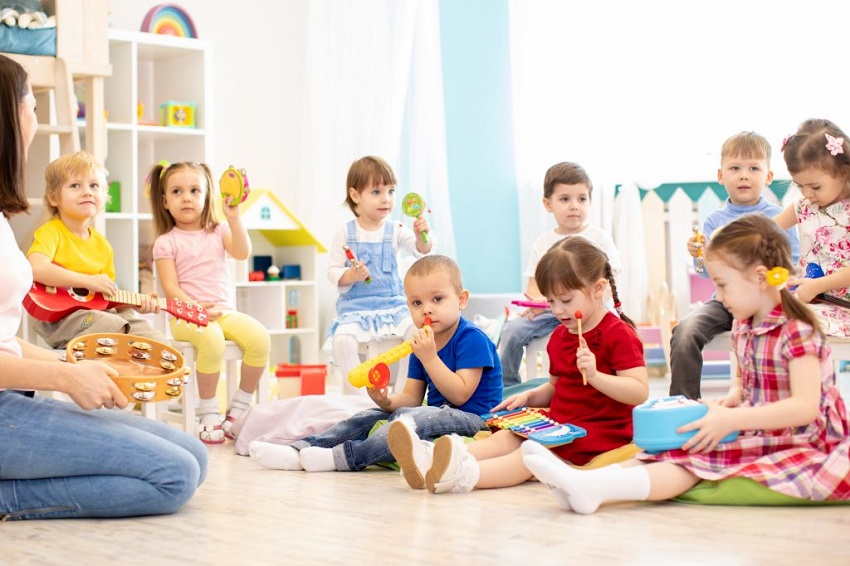Music holds a special place in the lives of children. It goes beyond being a form of entertainment; it plays a significant role in their development and growth. From early childhood, music can have a profound impact on various aspects of a child’s life, including cognitive, emotional, and social development. In this article, we will explore the importance of music for children, highlighting its numerous benefits and why it should be an integral part of their lives. This content is presented by Prforeducators.com
Music Enhances Cognitive Skills
When children engage with music, it stimulates their brain and enhances cognitive abilities. Studies have shown that exposure to music at a young age can improve a child’s spatial-temporal reasoning, language skills, and overall IQ. The rhythm and melodies in music activate various areas of the brain, fostering creativity and critical thinking.
Music Boosts Emotional Development
Music has a unique way of evoking emotions and feelings in children. It helps them express themselves and understand different emotions through sound and lyrics. Whether it’s listening to cheerful tunes or melancholic melodies, music allows children to explore their emotions in a safe and enjoyable manner, promoting emotional intelligence and empathy. Explore the Importance of Music Education.
Music Fosters Language Skills
Listening to and singing along with songs can significantly contribute to a child’s language development. The repetitive nature of music helps reinforce language patterns, improve vocabulary, and enhance pronunciation. Children who are exposed to music tend to have better communication skills and are more confident in expressing themselves verbally.
Music Improves Memory and Concentration
Learning songs and melodies requires memory and concentration, and regular engagement with music can enhance these cognitive functions in children. Music acts as a mnemonic device, making it easier for kids to remember information and concepts taught through songs, making learning a fun and enjoyable experience.
Music Encourages Physical Activity
Music often leads to movement, and for children, it can be a catalyst for physical activity and exercise. Dancing and clapping along with music not only promote gross motor skills but also help in releasing energy, reducing stress, and fostering a healthy lifestyle.
Music Strengthens Social Bonds
Music has a unifying effect, bringing people together through shared enjoyment. In a similar manner, it helps children build social connections and strengthen bonds with their peers. Group music activities like singing in a choir or playing in a band encourage teamwork, cooperation, and a sense of belonging.
Music Cultivates Creativity
Music is an excellent platform for children to unleash their creativity. Whether it’s composing their melodies or experimenting with different instruments, music fosters imagination and innovation. This creative expression not only enriches their lives but also helps them develop problem-solving skills.
Music Boosts Confidence and Self-Esteem
Participating in musical activities allows children to showcase their talents and achievements. Whether it’s performing on stage or mastering an instrument, these experiences contribute to boosting their confidence and self-esteem, promoting a positive self-image.
Music Provides a Sense of Cultural Identity
Exposing children to various genres of music from different cultures helps them develop an appreciation for diversity. It allows them to understand and respect different traditions and values, leading to a more inclusive and tolerant mindset.
Music Improves Motor Skills
Playing musical instruments requires precise motor skills, and learning to control their movements while playing helps children improve their fine motor skills. Whether it’s pressing keys on a piano or strumming a guitar, these actions enhance hand-eye coordination and dexterity.
Music Helps in Expressing Individuality
As children explore different genres of music, they can discover what resonates with them personally. This process of self-discovery aids in shaping their individuality and preferences, empowering them to embrace their uniqueness.
Music Relieves Stress and Anxiety
Just like it can energize, music also has a calming effect on children. Listening to soothing melodies can alleviate stress and anxiety, providing a coping mechanism for challenging situations.
Music Encourages Discipline and Practice
Learning to play an instrument or sing requires dedication and regular practice. Engaging with music instills discipline in children as they develop a sense of commitment to honing their musical abilities.
Music Nurtures a Lifelong Love for Learning
By incorporating music into a child’s life, parents and educators can instill a lifelong love for learning. This passion for music can extend to other subjects and activities, making the learning process more enjoyable and rewarding.
Music Stimulates the Imagination
The power of music to transport children to different worlds and scenarios is unparalleled. It sparks their imagination, enabling them to create vivid mental images and stories while they listen to melodies.
Conclusion
Music is an invaluable gift that enhances the lives of children in numerous ways. From promoting cognitive development to nurturing emotional well-being, music is an essential aspect of a child’s growth journey. Whether it’s through singing, dancing, or playing instruments, incorporating music into a child’s daily life can create a positive and enriching environment.
FAQs
Q: Can babies benefit from music as well?
A: Absolutely! Even infants can respond positively to soothing lullabies and melodies, which can help in their early brain development and establish a sense of comfort.
Q: How can I encourage my child to learn a musical instrument?
A: Offer them a variety of instruments to explore and let them choose the one that interests them the most. Provide gentle encouragement and praise their efforts as they learn.
Q: Are there any specific types of music that are best for children?
A: While there is no one-size-fits-all answer, age-appropriate and positive content is generally recommended. Classical music and nursery rhymes are often considered beneficial for young children.
Q: Can music help children with learning disabilities?
A: Yes, music therapy has shown promising results in aiding children with learning disabilities, enhancing their communication and social skills.
Q: How can schools incorporate music into their curriculum?
A: Schools can introduce music classes, choirs, or even integrate music into other subjects, making the learning experience more engaging and holistic.





